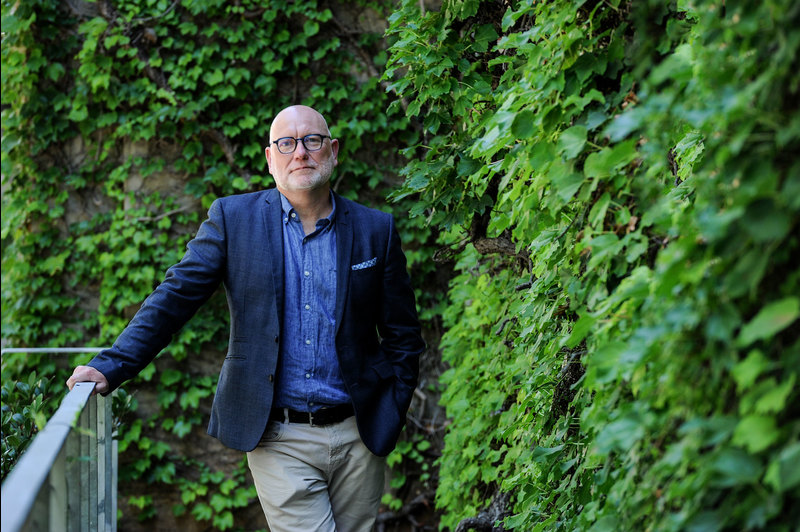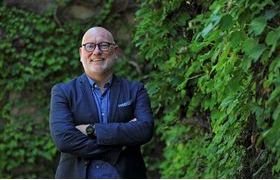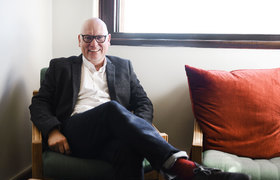Information disorder: Report harnesses Global South responses
03 May 2022 | Story Helen Swingler. Photo Lerato Maduna. Read time 9 min.
Information disorder threatens media freedom and democracies across the globe. In the Global South, multi-level responses are needed to counter its spread, said Professor Herman Wasserman, the editor of the recently released “Meeting the Challenges of Information Disorder in the Global South” report. He is based in the University of Cape Town’s (UCT) Centre for Film and Media Studies.
“World Press Freedom Day [3 May] reminds us how important freedom of expression and especially freedom of the media is for democratic debate and public participation in democracies for citizen empowerment. And information disorder threatens those values,” Professor Wasserman said.
His report defines information disorder as the “large-scale contamination of the public sphere with rumours, hate speech, dangerous conspiracy theories, harmful misunderstandings and orchestrated conspiracies of deception”. Although disinformation predates the social media era, today’s digital media landscape and polarised political environments greatly amplify its spread.
Journalism can help counter disinformation, provided that it inspires trust. “Journalism must be supported as a public good while continuing efforts to ensure ethical, trustworthy, quality content,” he added.
“We have seen how disinformation exacerbates problems in society, like xenophobia, vaccine hesitancy or anti-vax sentiment.”
With 75% of the world’s population, Global South states are generally poorer developing countries with younger, more fragile democracies. Here the problems of information disorder are even older than the Global North, Wasserman said in an interview ahead of World Press Freedom Day on 3 May.
“We have seen how disinformation exacerbates problems in society, like xenophobia, vaccine hesitancy or anti-vax sentiment. It has a real-world impact that affects us all, not only researchers and journalists and free speech practitioners – and it’s not going to go away. Rather, it’s a challenge that researchers, practitioners and members alike all are equally invested in.”
Wasserman’s report is timely, providing a comprehensive picture of how information disorder is being mitigated by a range of organisations and movements in the Global South. Funded by the International Development Research Centre (IDRC) of Canada, it synthesises comparative reports from four regional bodies: Research ICT Africa, InternetLab (Latin America and the Caribbean), LIRNEasia (Asia), and Arab Reporters for Investigative Journalism in the Middle East and North Africa.
Multi-level responses needed
The report calls for multi-level responses, particularly to protect press freedom.
“It doesn’t help to only try and counter fake news by doing fact checking if you don’t also ensure that citizens are able to access free media and for the press to operate freely.”
All these elements are interlinked and contribute to a broader set of aims.
“Information disorder is something that affects all of us, not only researchers, journalists and free speech practitioners.”
The report has been written not only to bridge the gap between academic researchers (most research has been focused on the Global North) and practitioners but to be accessible to the public too, “because information disorder is something that affects all of us, not only researchers, journalists and free speech practitioners”.
“Some of the more visible and egregious threats are those that are linked to governments clamping down on the media and on journalism and freedom of expression generally,” said Wasserman. “Ironically, fake news or disinformation has often become a smokescreen for governments to repress criticism, activism and freedom of speech – a ruse to prevent criticism or questioning.”
This has been the case in Nigeria, Kenya and India, where disinformation campaigns have threatened to derail elections.
Information deluge
But there are also other, more insidious threats, said Wasserman.
“People are overwhelmed with information. They don’t always know which are reputable sources and don’t necessarily have the skills to distinguish good information from bad. That is also a threat to the free flow of information.”
Organisations such as Africa Check and Real411 have played a valuable role. Here people can report disinformation free from intimidation and harassment. These entities have also worked to build media literacy among news services.
In some cases, media outlets themselves have fallen prey to disinformation, or their journalists have contributed to this. In South Africa, cases such as the Tembisa 10 reported on by Independent Media have eroded their authority and legitimacy.
“When we talk about press freedom, we must also talk about press responsibility: good journalism. Good, responsible journalism is also journalism that is responsive to context,” added Wasserman.
“This means journalism that takes its publics seriously, that views them not only as markets and passive audiences, but also as publics that can co-produce and co-contribute to journalism and freedom of speech. It’s finding multi-faceted solutions to a multi-faceted problem.”
Economic threats, weakened ethics
In the African context, media institutions are also struggling to survive financially.
“The broader media ecology has changed; journalism no longer has an automatic claim to centrality of news discourses. As audiences started moving away from printed publications and legacy media towards the online environment where advertising pools are now dispersed, old business models have collapsed, and new ones have emerged to fund journalism.”
Some media rely increasingly on paywalls and subscriptions. In others, institutional donors have stepped into the breach to fund journalism. One such example is the Bhekisisa Centre for Health Journalism in Africa, which has done phenomenal work during the pandemic, said Wasserman.
“All of these new models are trying to make up for the collapse of the older business model.”
“In an unequal country such as ours, we cannot only rely on commercial media to support the public interest.”
What then of the public service media?
“Our public broadcaster has unfortunately been highly problematic in recent years, the result of political and management factors,” said Wasserman. “In an unequal country such as ours, we cannot only rely on commercial media to support the public interest. We do need a strong and healthy public service media. And community media too.
“In this environment, press freedom is something that is not only the responsibility of professional journalists, but also something that everybody can support and contribute to. This inclusive orientation towards society is what we mean by journalism’s public interest.”
In training journalists, we must be cognisant of this responsibility, Wasserman said.
“When we train journalists, we shouldn’t train them as aloof, distanced, professional elites, but people who are plugged into their communities.”
“One part is training journalists to have the technical know-how to use new tools to access information and to do fact checking. But journalism now forms part of a much broader media ecology where media production has been democratised. It’s been diversified. When we train journalists, we shouldn’t train them as aloof, distanced, professional elites, but people who are plugged into their communities, who know what is happening on the ground.
“For good journalism to thrive, and to educate journalists who contribute to public-interest journalism, we need to help them get a good sense of context in terms of their communities and their country – and be connected to society. They should also have a good sense of how this media landscape is rapidly changing.”
Research opportunities
The topic of information disorder also presents a rich area for further research and Wasserman hopes to interest more students in this topic.
“We recognise that this [report] is an initial mapping of the field. We want to build on that and expand that in future.”
Facets of the report will be further integrated into Wasserman’s teaching on the topic of disinformation from undergraduate level.
“When we look at the world around us, we’ve come out of a pandemic, we live amid really worrying levels of xenophobia in our country, we see Russia waging war on Ukraine, and there are populist politics and polarisations everywhere. This underlines the importance of reliable, trustworthy information, and freedom of expression. Information disorder threatens this.
“But at the same time, World Press Freedom Day reminds us of the responsibility we all have to contribute to this participatory, open and trustworthy public sphere. Hopefully World Press Freedom Day will remind us that while we should celebrate the freedom of journalism as an institution in our country, we should also protect the values of free speech and public participation in our democracy.”
A webinar on the report will be presented on 6 May. Join the webinar. You can also RSVP via email.
 This work is licensed under a Creative Commons Attribution-NoDerivatives 4.0 International License.
This work is licensed under a Creative Commons Attribution-NoDerivatives 4.0 International License.
Please view the republishing articles page for more information.










